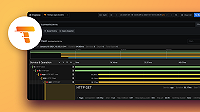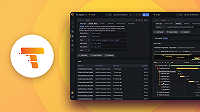This is documentation for the next version of Grafana Tempo documentation. For the latest stable release, go to the latest version.
Compression and encoding
Tempo can compress traces that it pushes to backend storage. This requires extra
memory and CPU, but it reduces the quantity of stored data.
Anecdotal tests suggest that zstd will cut your storage costs to ~15% of the uncompressed amount.
It is highly recommended to use the default zstd. (The compression field is used for the old v2 format. the vParquet* formats compress columns individually.)
Compression is configured under storage like so:
storage:
trace:
block:
v2_encoding: zstdThe following options are supported:
- none
- gzip
- lz4-64k
- lz4-256k
- lz4-1M
- lz4
- snappy
- zstd
- s2
Although all of these compression formats are supported in Tempo, at Grafana
we use zstd. It’s possible/probable that the other compression algorithms may have issue at scale.
File an issue if you have any problems.
WAL
The WAL also supports compression. By default, this is configured to use snappy. This comes with a small performance
penalty but reduces disk I/O and and adds checksums to the WAL. All of the above configuration options are supported
but only snappy has been tested at scale.
storage:
trace:
wal:
v2_encoding: snappy


